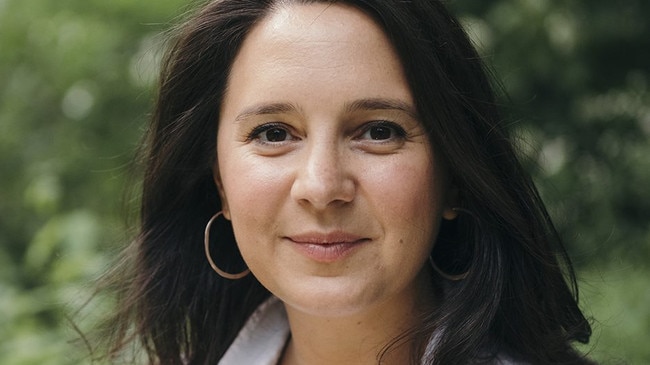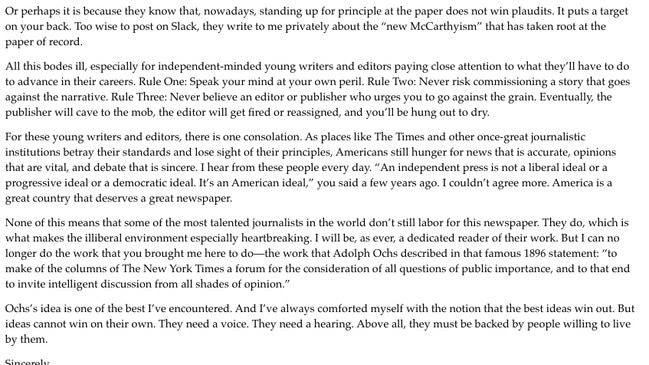How to cancel ‘cancel culture’
When illiberalism spreads, it’s only a matter of time before the cancellers come for you.

“First, they came for the authors, and I didn’t speak up because I wasn’t an author.
“Then they came for the comedians, and I didn’t speak up because I wasn’t a comedian.
“Then they came for the scientists, the economists, the academics, and I didn’t speak up because I wasn’t one of them.
“Then they came for the journalists, and I didn’t speak up because I was not a journalist.
“Then they came for me, and by that time no one was left to speak up.”
Each week brings more episodes of what, rightly or wrongly, we call “cancel culture”. This week, writer and editor Bari Weiss resigned from The New York Times citing the paper’s “illiberal environment”. Weiss wasn’t cancelled, but she is leaving because intolerance at the heart of cancel culture has settled into the NYT.
The New York Times hired Weiss after admitting that its one-eyed coverage of the 2016 presidential election failed readers. With another presidential election looming, Weiss fired off a powerful letter to NYT publisher AG Sulzberger lamenting that “intellectual curiosity” had become “a liability at The Times”.
“Twitter is not on the masthead of The New York Times. But Twitter has become its ultimate editor,” she wrote in reference to the narrow range of views favoured by the newspaper, and the ousting of NYT opinion editor James Bennet for running an opinion column that upset the sensibilities of some NYT staff.

Diversity of opinion took another hit this week when influential writer, editor and author of The Conservative Soul, Andrew Sullivan, announced his resignation from New York magazine. Posting on Twitter, Sullivan said that it was “pretty self-evident” why he was leaving, and he would discuss the “broader questions involved” in his final column due out on Friday in the US.
We can throw our arms up in dismay, frustration, even outrage at the daily loss of intellectual diversity. But it will be much more productive if, for the sake of democracy, we stand up against the blatant intolerance of cancel culture that has been repackaged by social justice activists as “the reckoning”.
Our modern liberal democratic project is just that. It’s recent. And it’s not writ in stone that it will succeed. It is a wholly human project that needs more people to defend it than not against those trying to replace it with something less liberal and less democratic.
And the heavy lifting will come down to each of us because elites can’t be relied on. University leaders rarely defend intellectual freedom. Business leaders promote faux diversity that doesn’t include differing opinions. The Morrison government has an economic crisis on its hands. And we are paying for a human rights commissioner who remains a mystery to most Australians because he hasn’t uttered a peep about the dangers of rising intolerance towards freedom of expression. Keeping your head down is no way to defend our most fundamental human right.
The sad truth is that cancel culture has been happening in different ways for many decades. Salman Rushdie copped a fatwa from Islamist extremists for writing a book called Satanic Verses. And now fatwas of a different kind come from within the West, our own mob culture hunting down dissidents and wrecking careers over differences of opinion.
The rot set in when we attached legal consequences to offence. It was an invitation for people to take offence and then impose their own version of justice without heading to a court or a human rights commission. We have a marketplace of outrage that routinely dismantles a marketplace of ideas and social media platforms that provide the perfect breeding ground for more short-form outrage and mob rule, rather than nuance, thoughtful argument and debate.
Still, we shouldn’t exaggerate cancel culture either. When a few nutty scribes on Twitter recently denounced Killing Eve star Jodie Comer for dating a Republican who might also be a Trump supporter, can we please not call this cancel culture. Nothing, and no one, was cancelled.
When Pauline Hanson was told by the Nine Network’s Today show that she won’t be a “regular” guest, and then sulked about an ad hoc gig, that was not cancel culture at work. No one, not even Hanson, has an inalienable right to demand a regular spot on any platform they desire, or to demand that a gig they had will continue ad infinitum.
Inflating cancel culture will simply arm those who say it’s all just a silly moral panic. Worse, if we use “cancel culture” to capture every case where someone is reprimanded or removed from a job, or whenever an editorial decision is made that upsets someone somewhere, we won’t attract more people to join a project to reinvigorate our culture, strengthen our democracy and ensure that our civilisation encourages free thought so critical to learning and progress.
While we might disagree on whether any particular episode is cancel culture or not, we can surely recognise a growing intolerance towards people expressing a diverse range of views. That intolerance delivers a triple whammy. First, it hinders our ability to sift the good ideas from the bad ones. Second, by shutting down robust debates, cancel culture will create unhinged, self-professed martyrs who thrive in online echo chambers, nurturing their hatred and bigotry far away from logical argument. And finally, the practitioners of cancel culture will stoke deep resentments that can easily be exploited by leaders who may not be defenders of a truly liberal democracy.
Earlier this week, long-time art curator Gary Garrels resigned from the San Francisco Museum of Modern Art after a staff petition sought his removal for “his toxic white supremacist beliefs regarding race and equity” when curating art collections. At a recent meeting over Zoom, staff confronted him with an earlier comment he made following a presentation about new acquisitions by artists of colour. Garrels is reported to have said, “Don’t worry, we will definitely still continue to collect white artists.” During the meeting last week, Garrels, who is one of America’s most prominent curators, said that not collecting the work of white men would amount to “reverse discrimination”.
Museum staff sought and succeeded in getting rid of the curator. And next up is the banishment of art by white people. This is nothing short of cultural apartheid.
When mobs tear down statues, that is a form of cancel culture familiar to the Taliban. In a vibrant democracy we should have robust, passionate debates about these matters and then decide whether a statue remains, is removed or needs better explanation.
When staff at publishing house Hachette threatened to stop working on a new children’s book by JK Rowling last month, that is cancel culture too. To its credit, Hachette defended free speech as a cornerstone of publishing, saying: “We will never make our employees work on a book whose content they find upsetting for personal reasons, but we draw a distinction between that and refusing to work on a book because they disagree with an author’s views outside their writing, which runs contrary to our belief in free speech.”
Cancel culture is killing comedy. Comedian Ricky Gervais says his mockumentary series The Office couldn’t be made today. The BBC cancelled an episode of Fawlty Towers last month because it might offend some people. True, the broadcaster corrected the mistake after a public furore, but note that the default setting was to cancel a comedy because they didn’t think we could be trusted to watch something from a different era.
If comedy stops being confronting for fear of being cancelled by a new generation of self-appointed cultural dietitians, we will lose more than our sense of humour. We will lose our ability to explore difficult subjects in myriad ways.
Over the last fortnight, the “Letter on Justice and Open Debate” published in Harper’s magazine and signed by 150 artists, authors, academics and other public intellectuals has attracted both kudos and criticism. Slamming it as “late, limp, and self-serving,” Gerard Baker in The Wall Street Journal pointed out that “only a handful of them spoke up when the mob was trying to cancel conservative thinkers”.
Sure, it’s a shame that some public intellectuals took so long to stand up for intellectual diversity. But, it’s also a case of better late than never. This is also how good ideas come to the fore when they are defended. Slowly, more and more people come to realise which ideas are better, why they matter, and why they need defending over and over again from bad ideas that have a habit of re-emerging.
Cancel culture is one of those really bad ideas. When illiberalism spreads, it’s only a matter of time before the cancellers come for you.





If we were to rework the famous lament by German pastor and theologian Martin Niemoller, it might go something like this: